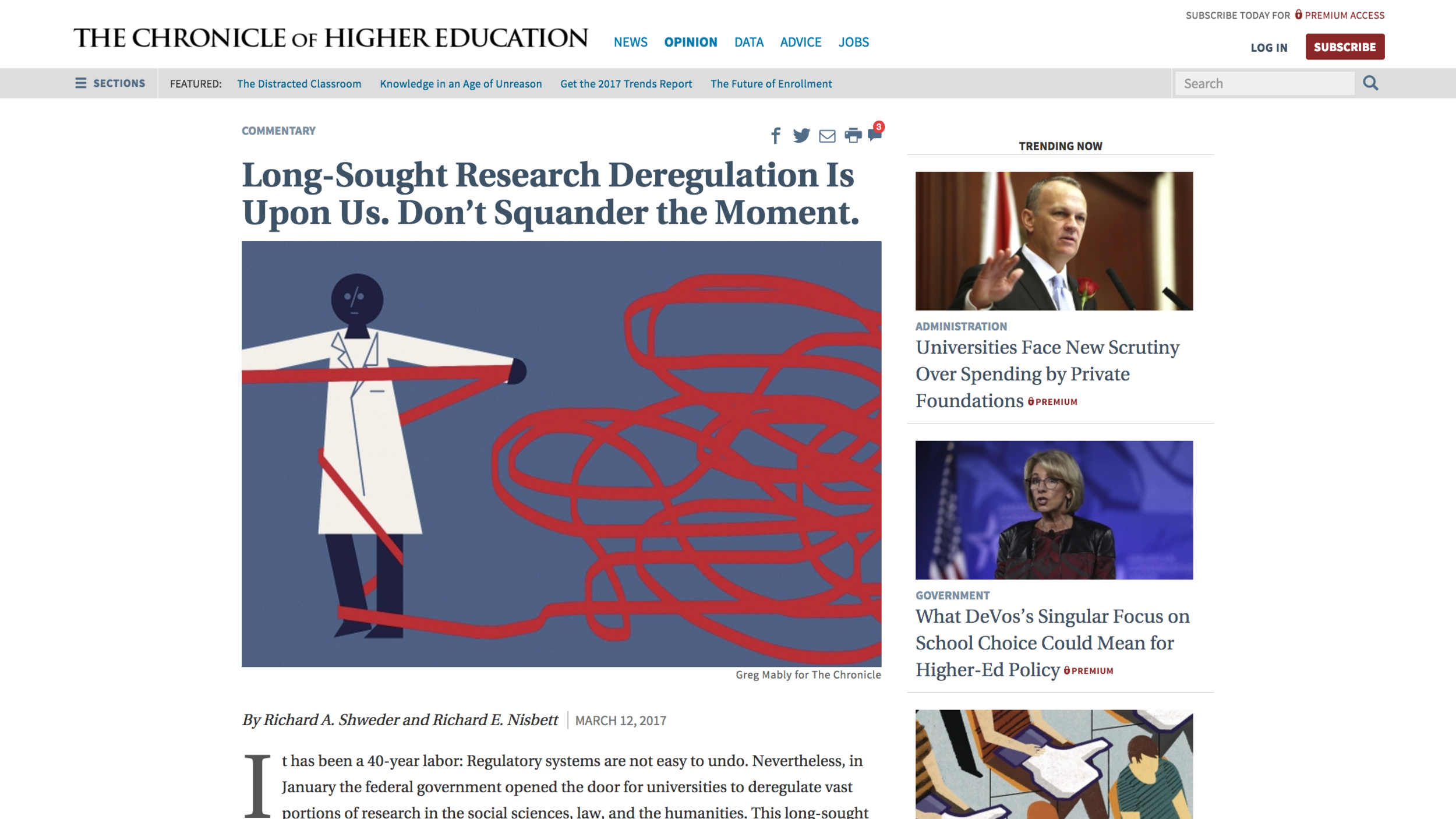Deregulation of Social Science as a Free Speech Issue
Update October 29, 2017: Here is a nice Powerpoint file on the changes to human subjects review regulations.
It was a huge week for social scientists. An article in the Chronicle of Higher Education by my University of Michigan colleague Richard Nisbett (a renowned psychologist) and University of Chicago cultural anthropologist and cultural psychologist Richard Shweder reported a plan for significantly reducing regulation of social science research:
The exempted research activities include surveys, interviews, and other forms of free communication between researchers and human adults, aptitude testing, the observation and recording of verbal and nonverbal behavior in schools and public places (for example, courtrooms), benign behavioral interventions (including ordinary psychology experiments), secondary-data analysis, and other low-risk projects and research procedures.
They also talked about an important deregulatory proposal that is under serious consideration, but not yet approved:
The decision as to whether a project should be exempt is left to the researcher, presumably using a plainly defined, self-administered exemption tool.
After my coauthor and former student Mark Fontana let me know about this article, I tweeted it and got an extraordinary response, which you can see in my Storify story "On the Deregulation of Social Science Research."
Upon reflection, the Twitter response that struck me the most is this from Katherine Fierlbeck:
This is SO important—I can't interview ppl w/o cumbersome ethics review, but journalists can do so at will w/o any ethical baggage.
With a day's delay, this tweet made me realize that being able to survey people is a free speech issue. If I ask someone a question, that is free speech on my part. If someone chooses to answer, that is free speech on their part. We would be aghast at the prior restraint involved in asking journalists to undergo government-mandated ethics review before asking anyone a question. Similarly, we should be shocked at social scientists having to undergo government-mandated ethics review before asking people questions—which might reveal things the government would rather were not revealed.
Let me say right away that it is totally legitimate to expect people to keep their promises—including promises about confidentiality. So everything I say here is based on the assumption that those conducting surveys keep their promises, plus fulfilling anything that a reasonable survey respondent would consider an implicit promise given the situation and what those conducting the survey have said.
Let me also say that survey researchers should definitely talk to other people about ethics issues raised by their research and voluntarily listen and follow good advice on that score. It is very difficult for someone to close to a research project to see all of the ethical issues involved. But despite the potential issues of making someone uncomfortable by asking them a question, the principles of free speech—and in the US, the First Amendment to the Constitution—should forbid mandatory rules restricting what questions can be asked on a survey, and also forbid rules restricting what can be reported about the findings, as long as that reporting keeps all explicit and implicit promises that have been made.
Surveys are subject to more involved ethics review when they ask about "sensitive" questions, that might make people uncomfortable. But surely "sensitive" questions are an area where free speech protections are particularly needed. Every culture has taboos surrounding talking about certain things. But those are often some of the most important things to talk about.
Recently, trying to understand continuing high levels of traffic for some of my back catalog, I discovered that (in incognito mode) if I type into Google
John Stuart Mill Free Speech
OR
John Stuart Mill Freedom of Speech
The second Google result is my post "John Stuart Mill's Brief for Freedom of Speech." It was a remarkable experience for me to blog through John Stuart Mill's On Liberty at about one blog post per paragraph. John Stuart Mill actually gives the arguments for free speech, rather than treating free speech as something whose goodness one takes on authority. I suspect that the lack of commitment to free speech I see in the ostensibly free world these days has much to do with the fact that the arguments in "On Liberty" in favor of free speech are not taught to students in detail. This is a good time to dig into those arguments. Although my treatment of those arguments is much less scholarly than the likely treatment in the first Google results, the Stanford Encyclopedia of Philosophy article on "Freedom of Speech," you might find reading my blogger's treatment of John Stuart Mill's arguments more nearly painless to read. Many of John Stuart Mill's arguments are directly relevant to the regulation of social science surveys. Because the arguments for free speech apply, the principles of free speech for those who are persuaded by those arguments also apply.
